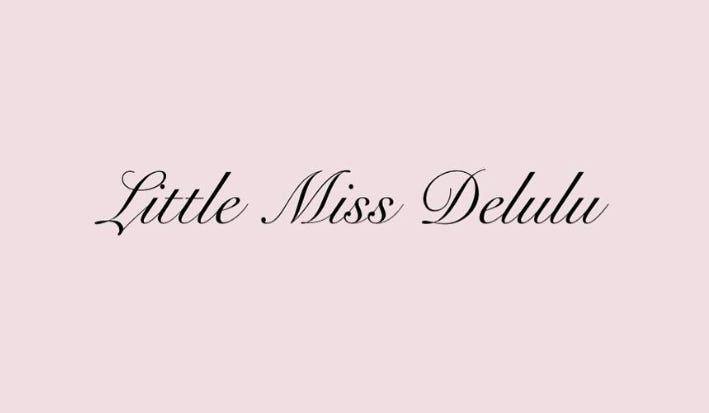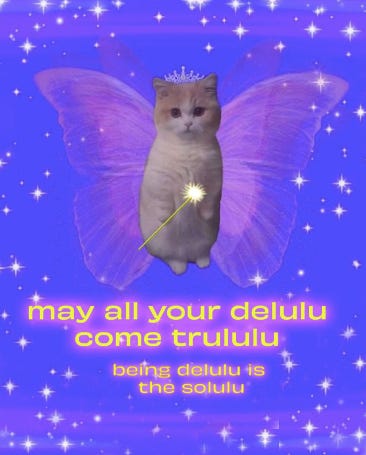“Unhinged.” “Feral Girl Summer.” And most recently, “delulu.”
I mostly notice these terms in some vaguely feminist literary context — a display at Powell’s featuring “unhinged women” or this Literary Hub beach reads list of books that are “lady on the streets, explicitly subversive freakshow between the sheets.” These seem to be efforts to harness the Madwoman in the Attic trope introduced by Sandra Gilbert and Susan Gubar in their landmark 1979 feminist critique of the same title. In The Madwoman in the Attic: The Woman Writer and the Nineteenth-Century Literary Imagination, Gilbert and Gubar argue writers like the Brontës, Emily Dickinson, and Jane Austen were “confined” by pervading literary tropes that presented female characters dichotomously as either angel or monster.
Ultimately, Gilbert and Gubar conclude that Victorian women authors relied on a “double-voiced” approach in which a feminist subtext is hidden within a conventional plot. Unhinged and feral girl are therefore terms for a “single-voiced” text in which “insanity” is actually a valid approach to an insane world and, is, therefore, hinged.
Delulu is a little different though.
The term, which originally referred to K-pop fan’s parasocial or “delusional” relationship with pop stars has — like all language — evolved. What once applied to a specific fan base has expanded to include anyone (although usually women) who holds unrealistic expectations or fantasies. The New York Times suggests “delulu” is not just a phrase used to describe overconfidence, but an extension of manifestation culture.
In “Who Are You Calling ‘Delulu’?,” NYT interviews Instagram life coach Wemi Opakunle who explains, “It takes a certain level of belief, faith and audacity to know that you can be something that you want to be. Delulu makes it fun.” Opakunle’s account features lots of photos of her looking beautiful in sequins and fringe alongside videos captioned things like, “WHAT IF LIFE IS COOKING UP SOMETHING BETTER?” and “ARE YOUR THOUGHTS/FEARS ACTUALLY SOMEONE ELSES?”
So the delulu definitional spectrum’s poles are:
1. A semi-organized system of magical belief.
Or,
A Millenial way of saying “fake it ‘til you make it.”
I’ve been thinking the other end is a lot less, to use Opakunle’s word, “fun.”
As “delulu” has evolved in usage to include cute rhymed phrases like “delulu is the trululu” and “delulu is the solulu,” the phrase gets further away from audacious self-confidence as a response to a chaotic world and a lot closer to self-help culture’s deeply capitalist fake it ‘til you make it mantra. This ideology has been especially employed by tech gurus, Silicon Valley, and cryptocurrency bros — although the poster child of modern fake it ‘til you make it culture is certainly Elizabeth Holmes of Theranos infamy.
The term hasn’t always been so insidious, though. Cognitive and behavioral psychologists have long employed versions of “fake it ‘til you make it” for the ideology’s therapeutic benefits when “directed towards a specific behavior or pattern of behavior…that does not serve overall best interests and might be described as maladaptive. Hence, [CBT patients] are often encouraged to ‘fake’ specific actions that they would like to eventually feel are genuine, and thus actually experience the positive feelings that are part of the ‘act.’” (Psychology Today).
So while a delulu framing is certainly capable of producing positive mental shifts when directed at an individual’s “specific behaviors,” the way this term is used within manifestation culture exclusively applies to changing reality outside the control of the individual. This is problematic for the obvious reason that genuine belief in one’s ability to produce change through thought alone is in and of itself maladaptive. Ultimately, if one’s delulu never turns trululu, this leads to an amplification of the very sense of powerlessness which prompted the belief that delulu is the only solulu.
Ultimately, if one’s delulu never turns trululu, this leads to an amplification of the very sense of powerlessness which prompted the belief that delulu is the only solulu.
Obviously, the popularity of a thought system that exacerbates a sense of helplessness is concerning. What really gets to me about the delulu discourse, though, is the way a common therapeutic conceit has been combined with esoteric manifestation culture to produce thought systems that are neither therapeutically beneficial nor spiritual, but rather totally mainstream capitalistic. In the phrase “delulu turns trululu,” what one wants to turn trululu is squarely within the world of commerce — a better job, more money, new stuff. At its heart — like fake it ‘til you make it — delulu turning trululu infuses one with the same aspirations and desires as, say, a commercial for perfume or a new car.
In one clean move, “delulu is the only solulu until its trululu” subverts the phrase’s ostensibly subversive cognitive framing in order to position one within the ideologies (ie., individualism, competition, and materialism)that most benefit mainstream institutions. In other words, delulu is the solulu to get you to work harder and believe more mindlessly in your ability to achieve within an unwinnable system. It’s the reverse of a double-voiced text: the conventional subtext is hidden within the feminist plot (ie., ideology).
I was fascinated to see how trends for the word “delusional” show a dramatic increase in usage over the past twenty years while trends for the word “delude” drop in opposition. It seems (at least linguistically) apparent that usage of a word meant to convey deception of others (delude) is displaced in favor of a word used to convey deception of the self (delusional). While it is apparent that capitalist ideologies are hardwired into the psyches of subjects of industrialized nations, it has never before occurred to me quite so strikingly that the wires of internal and external deception are so entwined.
In “The Invisible Hand Is An Ideology: Toward A Social Psychology Of Neoliberalism,” psychologists Karim Bettache and Chi Yeu Chia consider the way “neoliberalism…has evolved into a sociopolitical ideology and extended its hegemonic influence to all areas of life.” Bettache points out: “mainstream psychology has largely overlooked capitalism's effects. Textbooks tend to portray human thinking as universal to some degree, when in fact it may be guided by the values and practices of the societies, whether capitalist or not, in which people live. One reason for this oversight may be the fact that psychology and capitalism evolved together, making capitalism seem natural when it is actually cultural.”
In other words: the ostensibly mystical power of “delulu” is actually another way to ingrain “values and practices” of a non-mystical capitalist society and is, decidedly, not the “solulu.”
My camp rec for this week is:
Keep reading with a 7-day free trial
Subscribe to Bimbo Summit: A Pop Culture Study to keep reading this post and get 7 days of free access to the full post archives.









